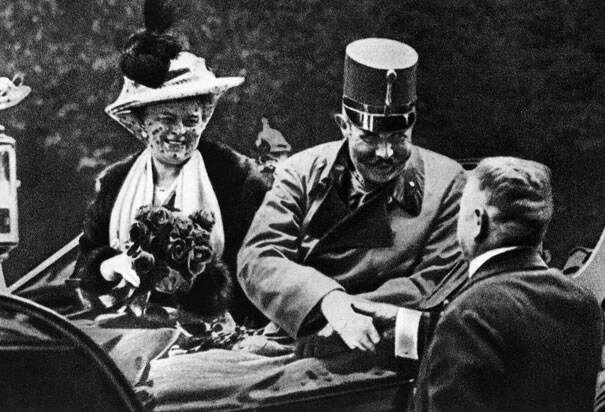Such happenstance! what happened in the city of Sarajevo, on June 28th, 1914. To recognize its significance and effect, one must understand the world that day’s deed erased.
A hundred years ago, Europe was at peace, enjoying the most beautiful of summers, still at the start of a new century, one promising all good things to humanity. Science and technology were remaking the world. Enlightenment was spreading, even to the darkest parts of Africa and Asia, albeit under colonial aegis.
In Europe the Ottoman Empire was waning, the last remnant of the Islamic invaders, who, two centuries earlier, had threatened Vienna itself. This was creating instability in the Balkans, where divided Slavs struggled to see whose religion and culture would emerge dominant.
Ruling the seas, Great Britain held sway over the world, though her centuries-old apprehension was being realized. A single nation, Germany, was emerging as a dominant continental power, chaffing that nationhood had come too late in the race for overseas colonies. Great Britain was allied with Republican France and Czarist Russia in a Triple Entente. The pact had one purpose, the containment of the continent’s Teutons; Germany’s only assured ally was the Austro-Hungarian Empire, ruled from Vienna by the aged Hapsburg Emperor, Franz Josef.
In late June, the emperor’s nephew, the heir to the Hapsburg throne, Franz Ferdinand, was visiting Sarajevo, the capitol of Bosnia-Herzegovina, a Slavic territory, which the empire had recently annexed. It wasn’t the highest level of state visit, which is why he could be accompanied by his morganatic wife, Sophie, the Duchess of Hohenberg. Because he had married a commoner, their children were barred from inheriting the throne and she was not accorded state honors.
Waiting for the royal couple in Sarajevo were seven assassins, sent by The Black Hand, an international terrorist organization dedicated to Serbian supremacy in the Balkans. Ironically, their chosen target, Franz Ferdinand, more pacifist than militarist, was an opponent of Austria’s annexation of Bosnia-Herzegovina.
Riding in an open car down the town’s principal thoroughfare, the royals were to be met by multiple sets of assassins, armed with pistols and fuse bombs. The first two, very young men, lost their nerve and failed to fire as the motorcade passed. A third hurled his bomb, which bounced off the Archduke’s car and exploded under an accompanying vehicle. Franz Ferdinand calmly saw to the care of wounded, and then laconically declared, “The fellow is insane. Gentlemen, let us proceed with the program.”
They did, racing to city hall, pass the other assassins. When the festivities there were concluded, the royal couple could have rid themselves of Sarajevo, but Franz Ferdinand insisted upon visiting the hospital, where those wounded earlier in the day had been taken.
This second motorcade would be much more heavily armed, moving rapidly through the city. But the archduke’s decision to visit the hospital wasn’t adequately communicated to the lead car, which mistakenly turned the motorcade onto its originally planned route. Realizing the error, the driver of the archduke’s car stopped to back the vehicle into the main thoroughfare.
That was the very intersection to which one of the assassins, Gavrilo Princip, still disconsolate over that morning’s failure, had returned. There were two or three seconds between the driver of the archduke’s car hitting the breaks and going into reverse. It sat motionless just long enough for Princip to fire two shots. The first entered Franz Ferdinand’s neck; the second, Sophie’s abdomen. Both died that day from their wounds.
Although the deed was serendipitous, it consequences seemed almost ineluctable. How could Austria-Hungary not punish Serbia, which had birthed and abetted the assassins? But could Russia ignore a declaration of war against a client state and not come to the aid of Slavic Serbia? The dominoes collapsed. Europe and its worldwide colonies thus entered the Great War, one that would claim, between combatants and civilians, more than 16 million lives and 20 million casualties. Three empires and their monarchs would collapse in the cataclysm: the Austro-Hungarian, the German and the Russian. A motorcades’ wrong turn redirected an entire century. History is the collective work of all who live, yet so often its great streams funnel through the sieves of solitary souls. Consider those of Saints Peter and Paul.
Like his Lord before him, St. Peter could not have had a more obscure, more backward birth. Nothing that could be called an education can be connected to him. Yet this fisherman would somehow make his way to Rome, because that city centered the world he considered himself commissioned to convert. He was martyred there, crucified in a round up of Christians, Nero’s scapegoats for the city’s flames.
St. Paul was more blessed by birth and education, but what would we know of him, without the letters, which he penned to his congregations? He also found himself in Rome, a solitary soul, convinced that the Lord of history required his presence as a prisoner in the city. He too was martyred, by a sword to his neck.
Humans emerge from evolution. How is it then, that we so radically outrun its pace? History ought to be a lumbering, weighty progress, any change of direction, slow and gradient. Yet sometimes, single souls, for good or ill, carry away centuries, capsize civilizations. Does it make sense for individuals to carry such weight? The Christian faith insists that they do. Calvary changed the cosmos. The blood of martyrs, so randomly shed, conquered Rome.
Most souls don’t change the entire world, but every soul changes some portion of it. The gospel has been preached for 20 centuries, yet its drama of sin and salvation still plays out in every soul, round which a world of friends, family, and familiars waivers, awaiting the result.
Acts 3: 1-10 Galations 1: 11-20 John 21: 15-19
Acts 12: 1-11 2 Timothy 4: 6-8, 17-18 Matthew 16: 13-19








